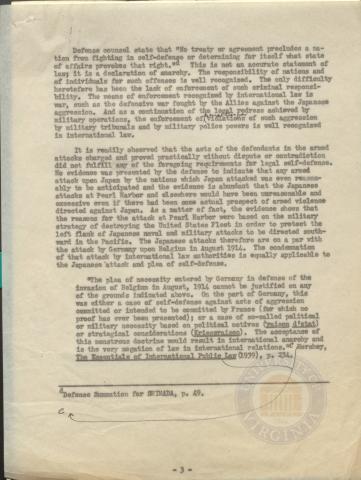
Page 3
| Parent | Item (5) April 9, 1948 |
|---|---|
| Date | 9 April 1948 |
| Language | English |
| Collection | Tavenner Papers & IMTFE Official Records |
| Box | Box 6 |
| Folder | General Reports and Memoranda from April 1948 |
| Repository | University of Virginia Law Library |
Defense counsel state that "No treaty or agreement precludes a nation from fighting in self-defense or determining for itself what state of affairs provokes that right.d This is not an accurate statement of law; it is a declaration of anarchy. The responsibility of nations and of individuals for such offenses is well recognised. The only difficulty heretofore has been the lack of enforcement of such criminal responsi-bility, The means of enforcement recognised by international law is war, such as the defensive war fought by the Allies against the Japanese aggression. And as a continuation of legal redress achieved by military operations, the enforcement of penalties for such aggression by military tribunals and by military police powers is well recognized in international law.
It is readily observed that the acts of the defendants in the armed attacks charged and proved practically without dispute or contradiction did not fulfill any of the foregoing requirements for legal self-defense. No evidence was presented by the defense to indicate that any armed attack upon Japan by the nations which Japan attacked was even reasonably to be anticipated and the evidence is abundant that the Japanese attacks at Pearl Harbor and elsewhere would have been unreasonable and excessive even if there had been some actual prospect of armed violence directed against Japan. As a matter of fact, the evidence shows that the reasons for the attack at Pearl Harbor were based on the military strategy of destroying the United States Fleet in order to protect the left flank of Japanese naval and military attacks to be directed south¬ward in the Pacific. The Japanese attacks therefore are on a par with the attack by Germany upon Belgium in August 1914. The condemnation of that attack by international law authorities is equally applicable to the Japanese attack and plea of self-defense.
"The plea of necessity entered by Germany in defense of the invasion of Belgium in August, 1914 cannot be justified on any of the grounds indicated above. On the part of Germany, this was either a case of self-defense against acts of aggression committed or intended to be committed by France (for which no proof has ever been presented)) or a case of so-called political or military necessity based on political motives (raison d'etat) or strategical considerations (Kriegsraison). The acceptance of this monstrous doctrine would result in international anarchy and is the very negation of law in international relations.e Hershey,
The Essentials of International Public Law (1939), p. 234.
d Defense Summation for SHIMADA, p. 49.
-3-
